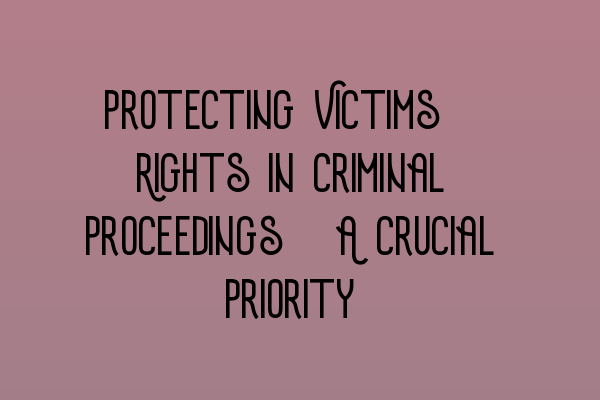Protecting Victims’ Rights in Criminal Proceedings: A Crucial Priority
When it comes to criminal proceedings, it is imperative that the rights of victims are protected at every stage of the legal process. Victims of crime often experience significant emotional and physical trauma, and it is vital that they are treated with compassion, respect, and fairness. The criminal justice system must prioritize providing support to victims and ensuring their rights are upheld.
One of the key aspects of protecting victims’ rights is ensuring their full participation in the criminal proceedings. Victims should be given the opportunity to provide their account of the events, present evidence, and be heard during various stages of the process. This not only empowers the victims but also helps to establish a fair and accurate representation of the facts.
Throughout the criminal proceedings, victims should have access to legal information and advice that clarifies their rights and the options available to them. This includes information about the legal process, their role as witnesses, and the availability of support services. By having a clear understanding of their rights, victims can make informed decisions and actively participate in the proceedings.
Related Article: SQE 1 Practice Exam Questions
Another crucial aspect of protecting victims’ rights is ensuring their safety and well-being during the proceedings. Victims should be provided with appropriate measures to protect them from intimidation, harassment, or retaliation. This may include obtaining restraining orders, providing secure waiting areas, or allowing remote testimonies. By addressing the safety concerns of victims, the criminal justice system can help create an environment that encourages them to come forward and participate without fear.
Furthermore, victims should have access to support services throughout the process. These services can include counseling, therapy, and other forms of assistance to help victims cope with the emotional and psychological impact of the crime. By providing such support, the criminal justice system acknowledges the long-lasting effects of crime on victims and demonstrates a commitment to their well-being.
Related Article: SQE 1 Practice Mocks FLK1 FLK2
Effective communication is also crucial in protecting victims’ rights. The criminal justice system must keep victims informed of the progress of their case, any relevant hearings, and the outcome of the proceedings. Regular updates and clear communication help victims feel valued, respected, and involved in the process. It is important to remember that victims often experience anxiety and uncertainty, and maintaining open lines of communication can alleviate these concerns.
Legal professionals and practitioners play a vital role in protecting victims’ rights. By staying up-to-date with relevant laws, regulations, and best practices, legal professionals can ensure that victims’ rights are upheld and advocated for. Additionally, ongoing training and education in victim-centered approaches can enhance professionals’ understanding of the unique needs of victims and enable them to provide appropriate support and guidance.
Related Articles: SQE 2 Preparation Courses, SQE 1 Preparation Courses
Ultimately, protecting victims’ rights in criminal proceedings is not just a legal obligation but a humanitarian imperative. By prioritizing victims’ rights, we can ensure that the criminal justice system operates with fairness, compassion, and respect for all parties involved.
If you would like to learn more about the SRA SQE exam dates and the requirements to qualify as a solicitor, please visit our website: SRA SQE Exam Dates.
